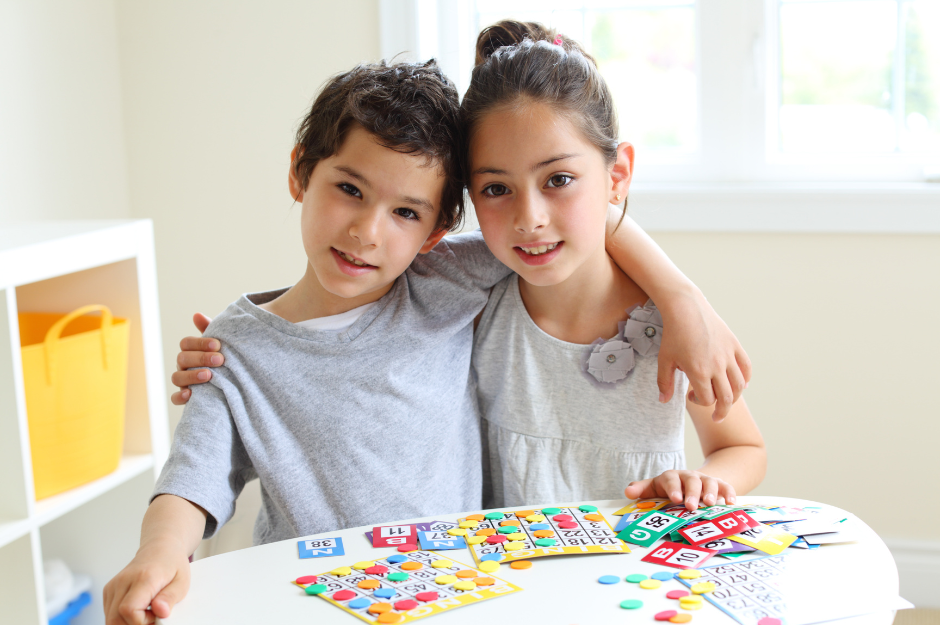- The Effectiveness of Learning English Through Play
- English Learning Games to Enjoy at Home
- English Game Activities in Schools and Groups
- Choosing Interactive English Learning Games
- Choose Games Aligned with Learning Objectives
- Select Age and Level-Appropriate Games
- Opt for Games with Interactive Elements
- Look for Games with Rich Visual and Auditory Elements
- Choose Games with Feedback and Progress Tracking
- Ensure the Game is Safe and User-Friendly
- Support Different Learning Styles
- Check Reputation and Reviews
- Conclusion: Making English Learning Fun with Games
The Effectiveness of Learning English Through Play
Learning English through playful experiences is very effective for children. This is because learning while having fun makes it easier to remember new words and expressions. Today, let’s focus on the “Effectiveness of Learning English Through Play” and talk about its charm and benefits.
Learning While Having Fun
The biggest advantage of learning English through play is the fun aspect. Games and activities, unlike traditional study methods, allow for less stress and more natural absorption of the language. In a fun environment, children are willing to try new things and use words without fear of making mistakes.
Cooperation and Competition
Many English learning games encourage cooperation and competition. This teaches children the importance of teamwork and improves communication skills with others. Additionally, healthy competition stimulates them and serves as a motivation to learn more.

Multisensory Learning
Learning English through play stimulates various senses of children, such as vision, hearing, and touch. This multisensory approach enhances language learning and helps in memorizing new words and phrases. Games, songs, and handmade activities make the learning process richer and more memorable.
Imitating a Natural Language Environment
Through play, children can imitate a natural language environment. This means using words and phrases used in real conversations and daily life in their play. Such activities directly connect to using English in real life, further improving their language skills.
English Learning Games to Enjoy at Home
Here are some games that beginners in English can enjoy at home. These games are designed so that children can naturally and enjoyably get acquainted with English.
Word Bingo
Word Bingo is suitable for beginners. Parents create bingo cards with simple English words, and the game leader calls out the words. If the children have the word on their card, they mark it. This game helps with learning new words and improving listening skills.

Color and Shape Game
In this simple game, children learn English words for colors and shapes. A parent says a color or shape, and the children find something in the house that matches it. This activity helps increase English vocabulary while associating it with objects around them.
Animal Sound Matching
Children love animals and enjoy imitating animal sounds. Prepare cards with pictures or drawings of animals and another set of cards introducing the sounds these animals make in English. Children match the sound cards with the correct animal cards. This game enhances listening skills and word recognition in a fun way.
Simple English Songs
Singing English songs together is a wonderful way for children to become familiar with English. Especially, songs with repetitive and simple vocabulary are suitable for children to naturally pick up the rhythm and vocabulary of the language. Set aside time to enjoy singing your favorite English songs together as a family.
Online English Learning Games
There are plenty of beginner-friendly English learning games available online. These games are helpful for solidifying the basics of English in a fun way. Playing these games allows children to learn words, phrases, and basic grammar, thus building their confidence in using English.
English Game Activities in Schools and Groups
Schools and gatherings with friends are great opportunities for children to learn English while having fun together. Group activities help develop cooperation, social skills, and communication skills. Here are some English game activities that can be enjoyed in classrooms or small groups.
Find Colors and Shapes
In this game, a teacher or leader calls out English words for colors and shapes, and children find objects with those colors or shapes in the classroom or designated area. For example, if “red” or “circle” is called out, they find and point to an item with those features. This activity promotes learning basic vocabulary and cooperation.
Animal Imitation
Prepare several popular animal cards, each labeled with the animal’s name in English. Children draw a card and imitate the animal’s sound or movement. Other children guess what the animal is in English. This game is a fun way to learn animal vocabulary and encourages learning through both hearing and sight.

Express with Your Body
Prepare cards with simple English verbs or actions (e.g., “jump,” “run,” “sleep”). One person draws a card and expresses the action with their body. Other children guess the verb in English. This activity increases verb vocabulary and promotes learning through physical activity.
Simple Songs and Hand Games
Simple English songs and hand games are perfect for memorizing words. Songs like “Head, Shoulders, Knees, and Toes” or “If You’re Happy and You Know It,” which include movements, help children learn English words and phrases in a fun way. These types of songs and hand games encourage learning vocabulary through rhythm and music and promote cooperation within the group.
Picture Card Matching
Prepare cards with simple English words and another set of cards with images that correspond to these words. Children spread the cards face down and match the word cards with the correct picture cards. This activity strengthens vocabulary by associating words with their corresponding images and enhances memory and concentration skills.
Choosing Interactive English Learning Games
Interactive English learning games are a fantastic tool to make learning English fun and engaging for children. With so many games available, choosing the right one can be daunting. Here are some points to help you select the best game for your needs.

Choose Games Aligned with Learning Objectives
When selecting a game, consider what the children need to learn and what interests them. Whether it’s vocabulary, grammar, pronunciation, or conversation practice, choosing a game that supports these learning objectives is crucial. Games that align with these goals help children learn more effectively and enjoy the process of enhancing their skills.
Select Age and Level-Appropriate Games
Choose games that match the children’s age and English proficiency level. Games that are too complex may confuse them, while those that are too simple might lead to boredom. Choosing games with the right level of difficulty ensures that children feel a sense of achievement while engaging in the learning process.
Opt for Games with Interactive Elements
Interactive games encourage active participation and engagement in the learning process. Games that promote conversation, problem-solving in cooperation with others, and player interaction are especially effective in improving communication skills.
Look for Games with Rich Visual and Auditory Elements
Games with colorful graphics, attractive characters, and enjoyable music or sound effects capture children’s attention and stimulate their motivation to learn. Games rich in visual and auditory elements deepen the learning experience through multiple senses.
Choose Games with Feedback and Progress Tracking
Knowing how much progress they have made is important in the learning journey. Games that offer feedback and track progress allow children, parents, and educators to understand which areas need reinforcement and provide appropriate support. Such games give children positive feedback, enabling them to confidently take the next steps in their learning.
Ensure the Game is Safe and User-Friendly
When children use games on the Internet, safety is paramount. Choose games from reliable developers with policies that protect personal information. Also, games with intuitive interfaces that children can easily navigate on their own are essential.
Support Different Learning Styles
Children learn in various ways. Some may excel in visual learning, while others prefer hands-on activities. Choosing games that support different learning styles ensures that all children can enjoy and maximize their learning experiences.
Check Reputation and Reviews
Finally, before selecting a game, checking its reputation and reviews from other parents or educators can be helpful. Feedback from those who have already used the game can provide valuable insights into whether it is suitable for your children.
Conclusion: Making English Learning Fun with Games
English learning can be more than just classroom study. Learning English through games is an incredibly effective and enjoyable method for children. This approach allows them to absorb the language naturally while playing and improve their communication skills. The various games and activities introduced here help with vocabulary learning, grammar practice, and conversation skills enhancement.
Games bring numerous benefits:
- Learning while having fun: Games are one of the best ways to learn while enjoying the process. Children learn in a playful manner, maintaining their motivation for learning.
- Practical experiences: Through games, children acquire language skills that can be used in real-life situations, making the language learning lively and practical.
- Confidence building: Successful experiences in games give children the courage to use English confidently. Games reduce the fear of making mistakes and foster a proactive attitude towards challenges.
- Accommodating different learning styles: Games are designed to meet the needs of different types of learners. Choosing games that include visual, auditory, and physical activities allows every child to learn in their preferred way.



